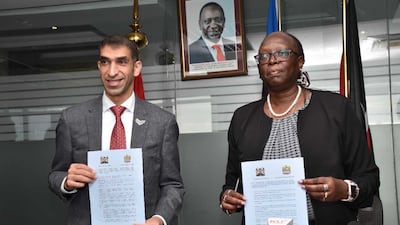The UAE and Kenya will soon start negotiations on a Comprehensive Economic Partnership Agreement, the UAE Ministry of Economy said on Friday.
Dr Thani Al Zeyoudi, Minister of State for Foreign Trade, and Betty Maina, Kenya's Cabinet Secretary for Industrialisation, Trade and Enterprise Development, signed a statement in Nairobi announcing plans to begin holding talks.
The trade deal will be the first Cepa that the UAE signs with an African nation.
Such an agreement will deepen trade and investment ties between Africa and the Middle East, and boost UAE-Kenya non-oil trade, which grew to $2.3 billion last year.
“There is tremendous opportunity for closer economic integration between our two nations, especially in agriculture, tourism, infrastructure, technology and renewable energy,” said Dr Al Zeyoudi.
After expanding the size of its economy to about Dh1.5 trillion ($409 billion), from Dh11bn in 1973, the UAE is pressing forward with various economic initiatives and trade agreements in line with plans to double its economic output over the coming decade to Dh3tn.
This year, the Emirates has signed three similar pacts with India, Israel and Indonesia that are expected to boost its economy by 2.6 per cent by 2030, Dr Al Zeyoudi said earlier this month.
The UAE and Kenya aim to remove trade barriers on a wide range of goods and services, creating opportunities for importers and exporters in both countries, and enabling Kenyan companies to benefit from the UAE’s geographic and logistical position.
“Announcing our intention to begin negotiations on the UAE-Kenya Cepa reflects our shared commitment to achieving greater economic progress through trade and investment,” Dr Al Zeyoudi said.
“Our efforts to establish strategic economic partnerships worldwide through our Cepas will fast-track our growth and prosperity for the next 50 years.”
Kenya's economy, the largest in East Africa, is expected to grow by 5.5 per cent this year, compared with 7.5 per cent in 2021, with the modest slowdown reflecting headwinds that have mounted pressure on global markets, the ministry said.
Tourism and agriculture remain its most dominant sectors, although the country has a fast-growing financial services industry, a competitive manufacturing sector and ambitious plans for green technology.
“High-level UAE-Kenya Cepa talks will begin in the coming months,” the ministry said.
The pacts with India, Israel and Indonesia are part of the UAE's Projects of the 50 initiative that aims to make the country a global business centre.
The agreement with India is expected to boost non-oil trade between the two nations to $100bn in five years, from $60bn currently.
A similar deal with Indonesia is expected to triple two-way trade in the next four years, from $2.5bn in 2020.
The pact with South Korea, which is expected to be finalised by the end of 2022, aims to enhance economic partnership between the countries to a minimum of $20bn in the next three to five years.
The UAE has also begun to hold trade negotiations with countries such as Turkey, Georgia and the Philippines.
Dr Al Zeyoudi said the Emirates plans to sign its fourth Cepa with Colombia.
“We have started the Cepa-signing negotiation process with several African and East Asian countries and Georgia. The country is also co-ordinating with Chile in this regard,” he said in early July.
The UAE plans to sign 27 similar agreements in total as it looks to boost trade and foreign direct investment, Minister of Economy Abdulla bin Touq said in April at the Annual Investment Meeting in Dubai.
The Emirates was among the top 20 recipients of foreign direct investment last year as investment inflows increased 4 per cent annually to $20.7bn.
That led to the country's “cumulative foreign direct investment” over the past 10 years to reach about $171.6bn by the end of 2021, a growth of 13.7 per cent.

